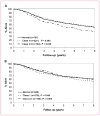Obesity is an independent prognostic variable in colon cancer survivors
- PMID: 20215553
- PMCID: PMC2948494
- DOI: 10.1158/1078-0432.CCR-09-2636
Obesity is an independent prognostic variable in colon cancer survivors
Abstract
Purpose: Obesity is associated with an increased risk of colon cancer. However, the influence of body mass index (BMI) on the prognosis of colon cancer survivors and its relationship to gender remains unknown.
Experimental design: BMI (kg/m(2)) was categorized in patients with tumor-node-metastasis stage II and III colon carcinomas (n = 4,381) enrolled in seven randomized trials of 5-fluorouracil-based adjuvant chemotherapy. Cox proportional hazards models were used to determine the association of BMI with disease-free survival (DFS) and overall survival (OS).
Results: Among colon cancer patients, 868 (20%) were obese (BMI, >or=30 kg/m(2)), of which 606 were class 1 (BMI, 30-34 kg/m(2)) and 262 were class 2,3 (BMI, >or=35 kg/m(2)). Obese versus normal-weight patients were more likely to be younger, have distal tumors, show intact DNA mismatch repair, and have more lymph node metastases (P < 0.017). In a multivariate analysis, BMI was significantly associated with both DFS (P = 0.030) and OS (P = 0.0017). Men with class 2,3 obesity showed reduced OS compared with normal-weight men [hazard ratio, 1.35; 95% confidence interval, 1.02-1.79; P = 0.039]. Women with class I obesity had reduced OS [hazard ratio, 1.24; 95% confidence interval, 1.01-1.53; P = 0.045] compared with normal-weight women. Overweight status was associated with improved OS in men (P = 0.006), and underweight women had significantly worse OS (P = 0.019). BMI was not predictive of therapeutic benefit.
Conclusions: Obesity is an independent prognostic variable in colon cancer survivors and shows gender-related differences. These data suggest that obesity-related biological factors can influence clinical outcome.
Conflict of interest statement
No potential conflicts of interest were disclosed.
Figures


References
-
- Hedley AA, Ogden CL, Johnson CL, Carroll MD, Curtin LR, Flegal KM. Prevalence of overweight and obesity among US children, adolescents, and adults, 1999–2002. JAMA. 2004;291:2847–50. - PubMed
-
- Larsson SC, Rutegard J, Bergkvist L, Wolk A. Physical activity, obesity, and risk of colon and rectal cancer in a cohort of Swedish men. Eur J Cancer. 2006;42:2590–7. - PubMed
-
- Pischon T, Lahmann PH, Boeing H, et al. Body size and risk of colon and rectal cancer in the European Prospective Investigation Into Cancer and Nutrition (EPIC) J Natl Cancer Inst. 2006;98:920–31. - PubMed
-
- Giovannucci E, Ascherio A, Rimm EB, Colditz GA, Stampfer MJ, Willett WC. Physical activity, obesity, and risk for colon cancer and adenoma in men. Ann Intern Med. 1995;122:327–34. - PubMed
-
- Le Marchand L, Wilkens LR, Mi MP. Obesity in youth and middle age and risk of colorectal cancer in men. Cancer Causes Control. 1992;3:349–54. - PubMed
Publication types
MeSH terms
Substances
Grants and funding
LinkOut - more resources
Full Text Sources
Medical

